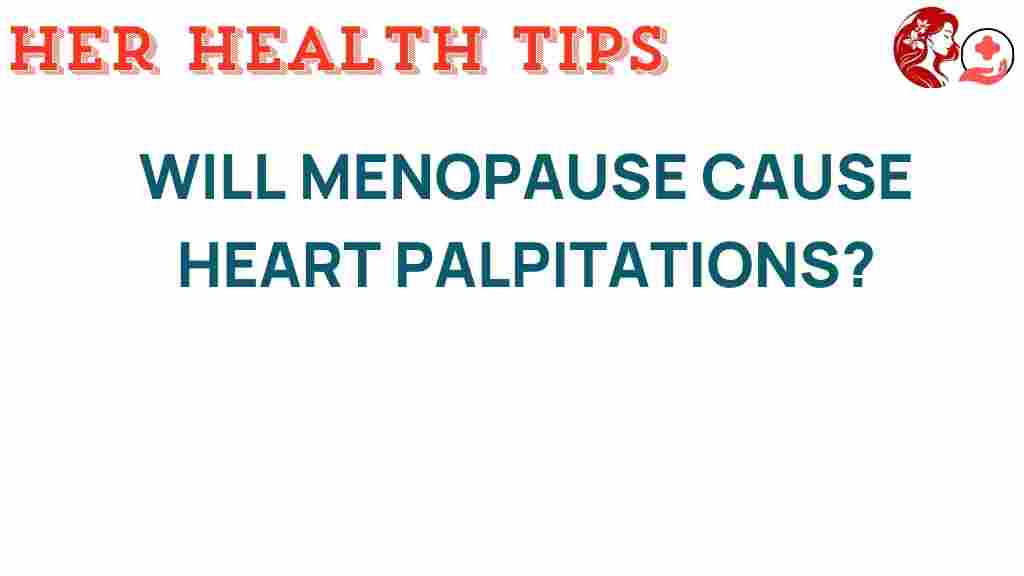Unraveling the Connection: Do Heart Palpitations Signal Menopause?
Menopause is a natural biological process that marks the end of a woman’s reproductive years, typically occurring between the ages of 45 and 55. As women approach this transitional phase, they often experience various symptoms due to hormonal changes. One symptom that frequently raises concerns is heart palpitations. In this article, we will explore the connection between menopause and heart palpitations, shedding light on their causes, implications for women’s health, and ways to manage them effectively.
Understanding Menopause and Hormonal Changes
Menopause occurs when the ovaries cease to produce eggs, leading to a significant drop in hormone levels, particularly estrogen and progesterone. These hormonal fluctuations can trigger a range of symptoms, including:
- Hot flashes
- Night sweats
- Sleep disturbances
- Mood swings
- Heart palpitations
Heart palpitations are characterized by the sensation of a racing, fluttering, or pounding heart. While they can be alarming, they are often benign and linked to the hormonal changes associated with menopause.
The Connection Between Heart Palpitations and Menopause
Many women report experiencing heart palpitations during perimenopause and menopause. These palpitations can be attributed to several factors, including:
- Hormonal Changes: The decline in estrogen levels affects the autonomic nervous system, which regulates heart rate and blood pressure.
- Anxiety and Stress: The emotional and physical changes during menopause can lead to increased anxiety, which may cause or exacerbate palpitations.
- Sleep Disturbances: Night sweats and insomnia can lead to fatigue and stress, contributing to heart palpitations.
- Cardiovascular Health: Aging itself is a risk factor for heart conditions. Menopause may herald changes in cardiovascular health that can manifest as palpitations.
Symptoms Associated with Heart Palpitations
When experiencing heart palpitations, women may notice various accompanying symptoms, such as:
- Chest discomfort
- Dizziness or lightheadedness
- Shortness of breath
- Fatigue
- Feelings of anxiety or panic
It’s essential to distinguish between harmless palpitations and those that may signal a more serious condition. If palpitations occur frequently or are accompanied by severe symptoms, it is crucial to consult a healthcare professional.
Step-by-Step: How to Manage Heart Palpitations During Menopause
Managing heart palpitations during menopause involves a combination of lifestyle changes, stress management, and medical intervention when necessary. Here’s a step-by-step approach:
1. **Consult Your Healthcare Provider**
Before making any changes, it’s essential to consult with a healthcare provider to rule out any underlying cardiovascular issues. They may recommend tests such as:
- Echocardiogram
- Electrocardiogram (ECG)
- Holter monitor
2. **Adopt a Heart-Healthy Diet**
Nutrition plays a vital role in cardiovascular health. Consider incorporating:
- Fruits and vegetables
- Whole grains
- Lean proteins (such as fish and poultry)
- Healthy fats (like avocados and nuts)
Avoid excessive caffeine, alcohol, and processed foods, as they can exacerbate palpitations.
3. **Engage in Regular Physical Activity**
Regular exercise can improve cardiovascular health, reduce stress, and help manage weight. Aim for at least 150 minutes of moderate aerobic activity each week, such as:
- Walking
- Swimming
- Cycling
4. **Practice Stress Management Techniques**
Stress and anxiety can trigger heart palpitations. Consider incorporating relaxation techniques such as:
- Meditation
- Yoga
- Deep-breathing exercises
These practices can help promote calmness and reduce the frequency of palpitations.
5. **Stay Hydrated**
Dehydration can lead to electrolyte imbalances, causing palpitations. Ensure you drink enough water throughout the day, especially if you are active.
6. **Monitor Your Symptoms**
Keep a diary of your palpitations, noting their frequency, duration, and any triggers. This information can be beneficial for your healthcare provider in determining the best course of action.
Troubleshooting Tips for Heart Palpitations
If you experience heart palpitations, here are some troubleshooting tips to help manage your symptoms:
- Avoid Stimulants: Limit caffeine and nicotine, which can increase heart rate.
- Evaluate Your Medications: Some medications can cause palpitations. Discuss any concerns with your doctor.
- Manage Your Weight: Maintaining a healthy weight can reduce the stress on your heart.
- Prioritize Sleep: Establish a regular sleep schedule to improve overall well-being.
Health Awareness: Knowing When to Seek Help
While heart palpitations during menopause are often benign, it’s essential to be aware of when to seek medical attention. Contact your healthcare provider if you experience:
- Palpitations lasting more than a few minutes
- Fainting or dizziness
- Chest pain or discomfort
- Shortness of breath
- Palpitations that occur with other concerning symptoms
Being proactive about your health can help you navigate the changes that come with aging and menopause.
Conclusion: Embracing the Transition
Menopause is a significant life transition that brings about various changes in a woman’s body, including heart palpitations. Understanding the connection between menopause, hormonal changes, and heart health is crucial for managing symptoms effectively. By adopting a heart-healthy lifestyle, practicing stress management techniques, and staying informed about your health, you can navigate this phase with confidence.
Remember, you are not alone in this journey. Engaging with community resources and support groups can enhance your health awareness and provide valuable insights into managing menopause and its symptoms effectively. For more information on women’s health during menopause, you can visit this resource.
Taking charge of your health is empowering. With the right knowledge and strategies, you can embrace this new chapter in your life while maintaining your cardiovascular health and overall well-being.
This article is in the category Conditions and created by HerHealthTips Team
